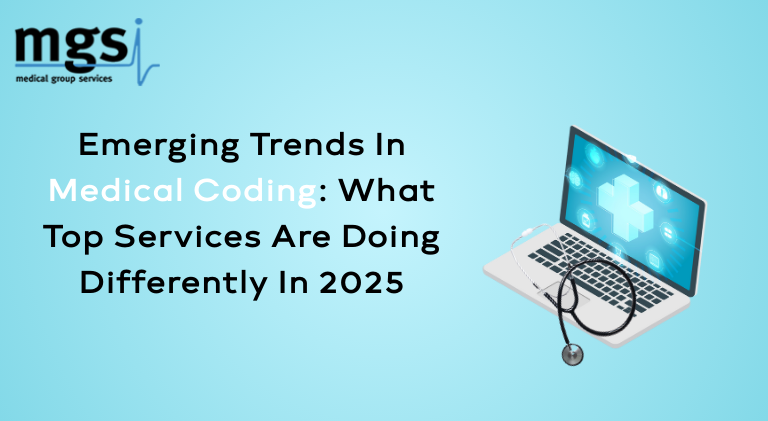
The medical coding environment is evolving at a rapid pace as healthcare organizations experience mounting pressure for accuracy, efficiency, and regulatory compliance. In 2025, leading medical coding companies are leveraging advanced strategies to remain competitive in a highly regulated and competitive landscape. As either a health organization interested in outsourcing or coding professional coping with changes within the industry, you can benefit from staying abreast of the evolving trends and be aligned with the best practices dictating the future.
Here’s how the top medical coding companies are changing their approach in 2025—and what it implies for the industry.
1. AI-Driven Coding Becomes the New Norm
Artificial Intelligence (AI) is no longer a buzzword—it’s a game-changer in medical coding. The top medical coding companies now employ AI tools and natural language processing (NLP) to examine clinical documentation and assign the right codes. These systems eliminate human errors, enhance productivity, and significantly minimize turnaround time.
For example, leading medical coding companies are applying AI to:
- Auto-suggest ICD-10, CPT, and HCPCS codes
- Flag potential compliance issues
- Learn and conform to provider documentation practices
Through a combination of AI and human review, these firms can achieve the optimal mix of speed and accuracy.
2. Remote Coding Teams and Global Talent Pools
The remote work revolution has remodeled the hiring models of top medical coding firms. With secure cloud-based platforms and HIPAA-compliant procedures, firms can access a larger pool of talent from anywhere in the world. Certified coders located in the U.S., India, and the Philippines work together in real-time, providing 24/7 coverage and flexibility.
Best medical coding services of 2025 focus not only on recruiting talent but on creating specialized teams for various specialties—orthopedics, cardiology, internal medicine, and so on. This hyper-specialization results in improved accuracy and increased speed of claim processing.
3. Greater Emphasis on Risk Adjustment and HCC Coding
As value-based care models grow, medical coding companies are focusing more on Risk Adjustment and Hierarchical Condition Category (HCC) coding. Accurate HCC coding makes sure that health plans and providers receive proper reimbursement for treating patients with chronic and complex conditions.
Leading medical coding services in 2025 are educating coders to:
- Comprehend clinical documentation profoundly
- Recognize under-documented or undocumented chronic conditions
- Work with physicians to increase coding accuracy
This trend has nothing to do with revenue—it’s about improved patient care and population health management.
4. Real-Time Quality Auditing and Feedback
Post-billing audits are a thing of the past. Top-notch medical coding companies now utilize real-time quality audits. Coders get instant feedback and have the opportunity to correct mistakes before claims submission. This prevents denials and rework significantly.
Pioneering medical coding businesses are utilizing dashboards and analytics to:
- Track coder performance
- Find recurrent errors
- Create actionable recommendations for training and development
This ongoing feedback process is a signature of a high-performing medical coding firm.
5. Compliance Takes Center Stage
Regulatory oversight of healthcare data in 2025 is tighter than ever. Leading medical coding firms focus on compliance with:
- HIPAA (Health Insurance Portability and Accountability Act)
- OIG (Office of Inspector General) guidelines
- CMS (Centers for Medicare & Medicaid Services) updates
In order to remain compliant, businesses are:
Investing in ongoing coder education and certifications
Auditing internal processes regularly
Implementing secure, encrypted platforms for all handling of data
Compliance isn’t only about penalty avoidance—it’s about establishing long-term client trust.
6. EHR Integration and Interoperability
Top medical coding firms are no longer isolated islands. They seamlessly integrate with Electronic Health Record (EHR) systems, allowing for simpler access to patient data, reading clinical intent, and applying accurate codes.
- Best-in-class medical coding companies are opting for platforms that:
- Sync with leading EHRs such as Epic, Cerner, and Allscripts
- Offer coders customizable views and workflows
- Automatically apply coding rule updates
This integration results in streamlined operations, greater coordination, and enhanced accuracy.
7. Tailored Solutions for Specialty Practices
Each medical specialty poses distinctive coding challenges. A cardiologist’s documentation is very different from that of a pediatrician. To address this, leading medical coding companies provide customized solutions for various specialties.
They task coders with:
- Appropriate specialty certifications (such as CPC, CCS, or CRC)
- Experience in particular procedures and terminologies
- Continuing specialty-specific training
This method allows even the most complicated codes to be captured correctly on the first attempt.
8. Data-Driven Decision Making
Data isn’t only for coding anymore. In 2025, medical coding firms are applying analytics to drive performance and innovation. They monitor KPIs like:
- Coding accuracy rates
- Average time spent on coding per chart
- Denial trends by payer or specialty
Armed with these insights, companies can make faster decisions, identify gaps, and continuously improve.
The medical coding sector is witness to a significant shift in 2025. Be it AI deployment or specialty-specific solutions, the top-notch medical coding services are keeping pace by adopting technology, ensuring accuracy, and adhering to compliance. It is no longer a choice but a necessity for healthcare organizations to enhance revenue cycles by getting associated with a visionary medical coding firm.
By remaining up-to-date on these trends and contracting with the best medical coding firms, providers are able to optimize operations, minimize denials, and ultimately improve patient care.
